Abstract
Reaction to medical, social, and genetic implications of Huntington's disease was evaluated by means of a questionnaire mailed to members of a lay organization concerned with this disease in the United States. One thousand and sixty-five of the approximately 2600 members chose to respond. Patients and those at high risk found physical disabilities most disturbing while mental deterioration and personality change were the most disturbing to spouses of patients. The best source of information regarding the disease for 46% was the lay organization itself. Medical specialists or genetic counsellors were cited as the best source of information by 18%. The transmission risk in Huntington's disease was correctly stated to be one-half by 92% of all respondents including 94% of those who indicated the lay organization as best source and 91% of those who indicated medical specialists and genetic ounsellors as best source. If at risk for Huntington's disease, 86% of respondents would modify their family size; desire for limitation was greatest among those affected but lowest among young adults at high risk. If a screening test were available, 23% at high risk might refuse it.
Full text
PDF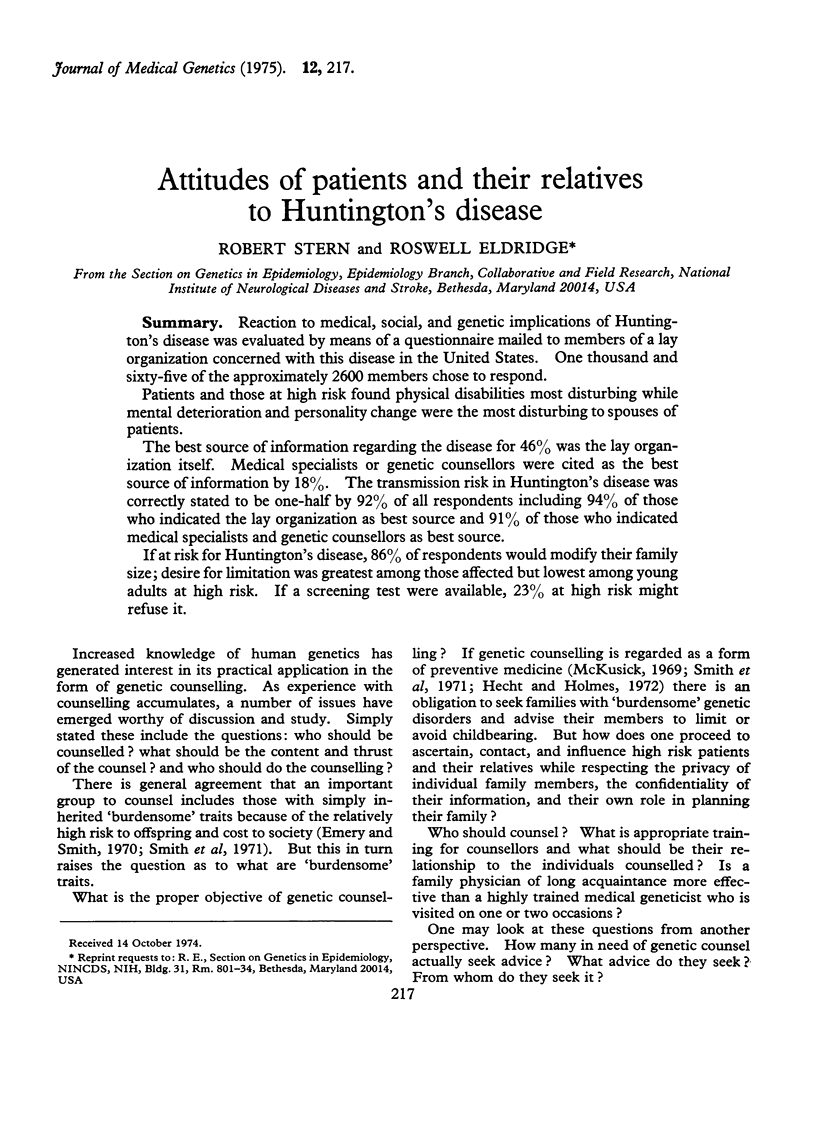
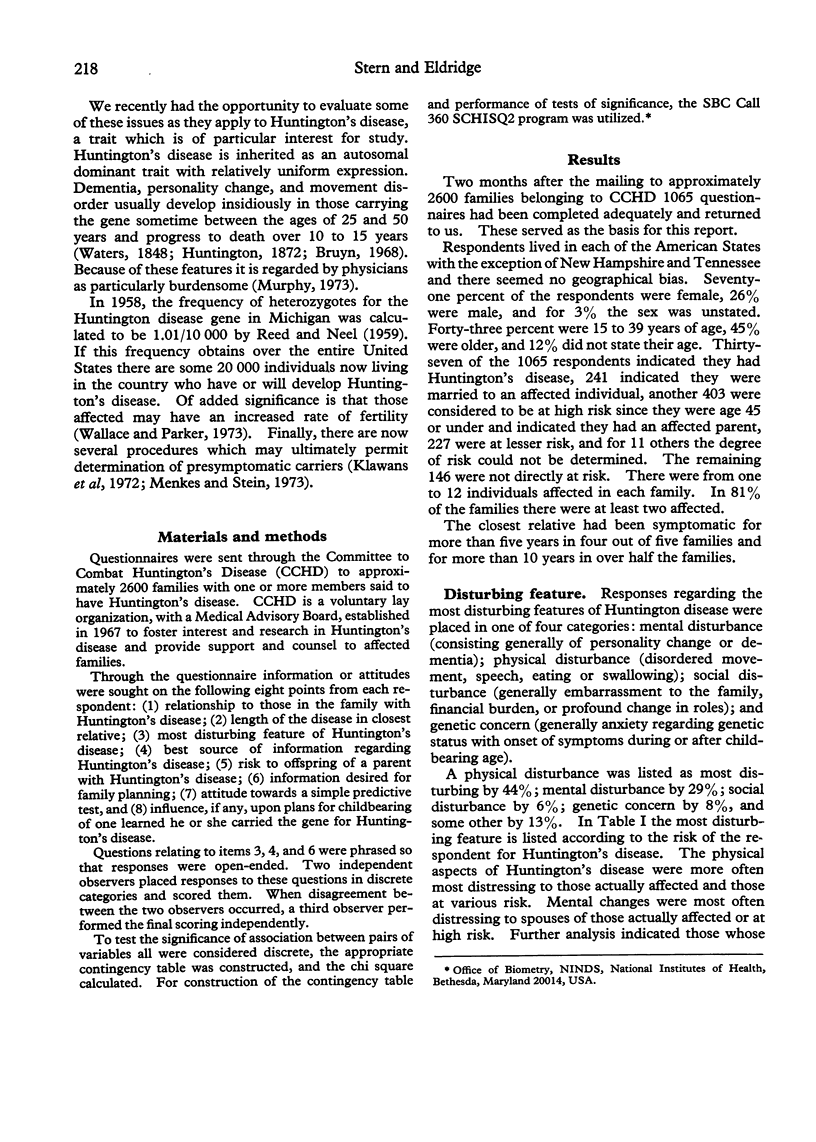
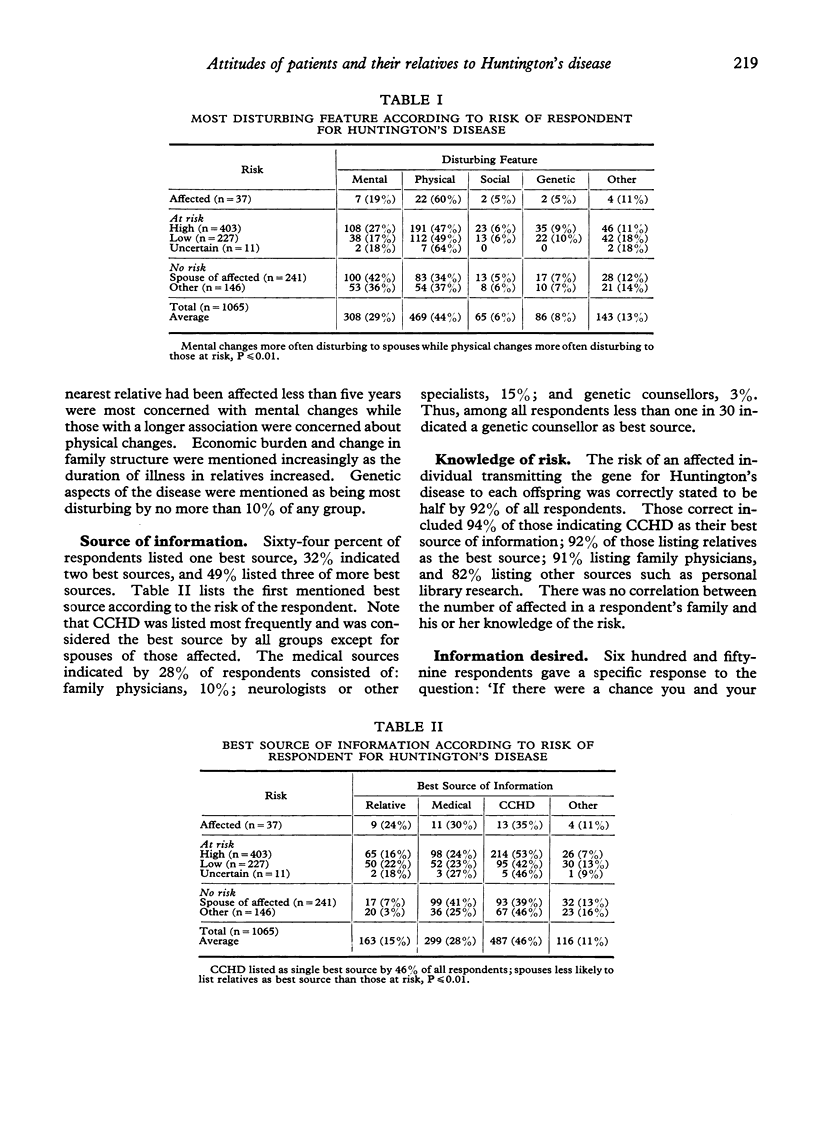
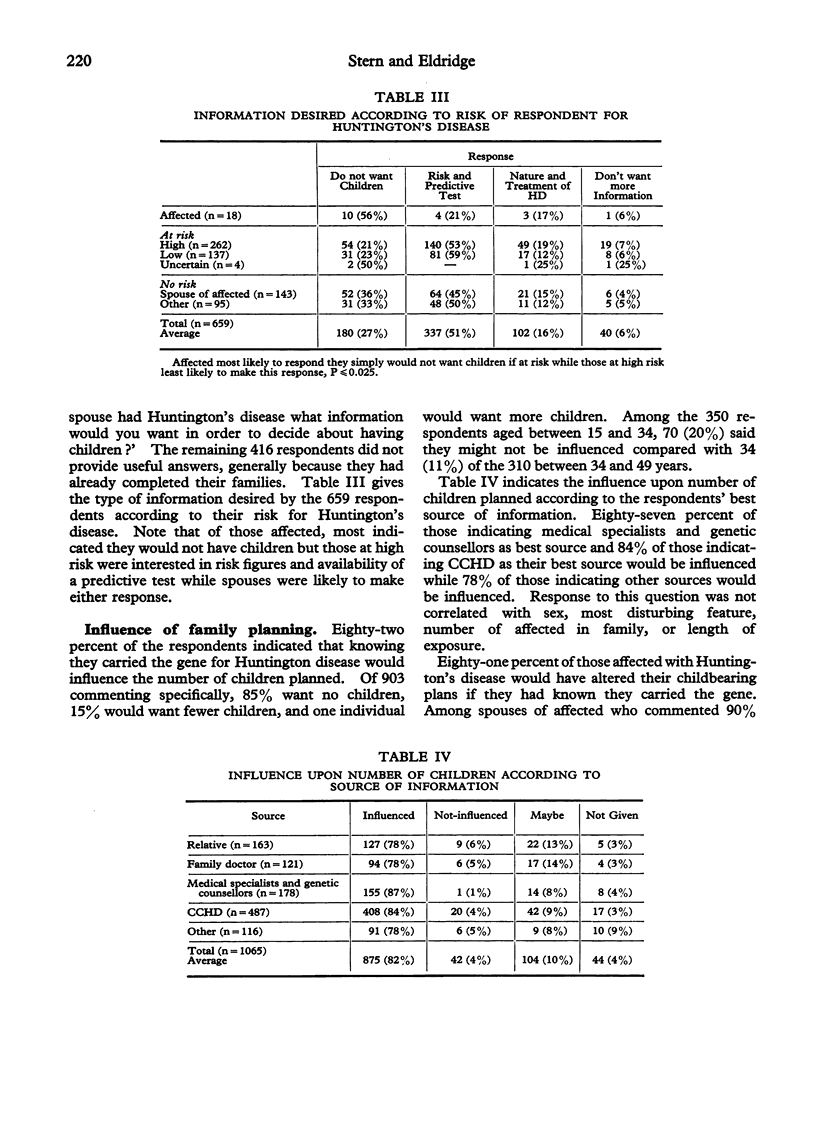
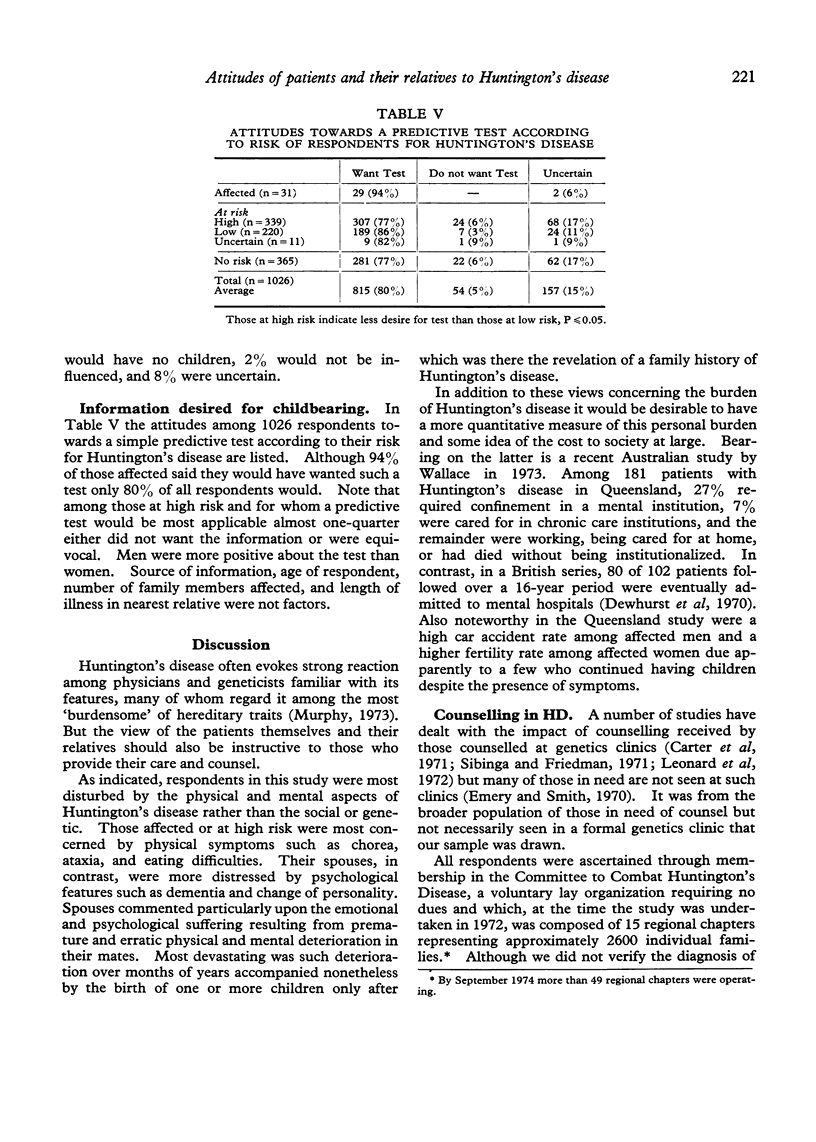
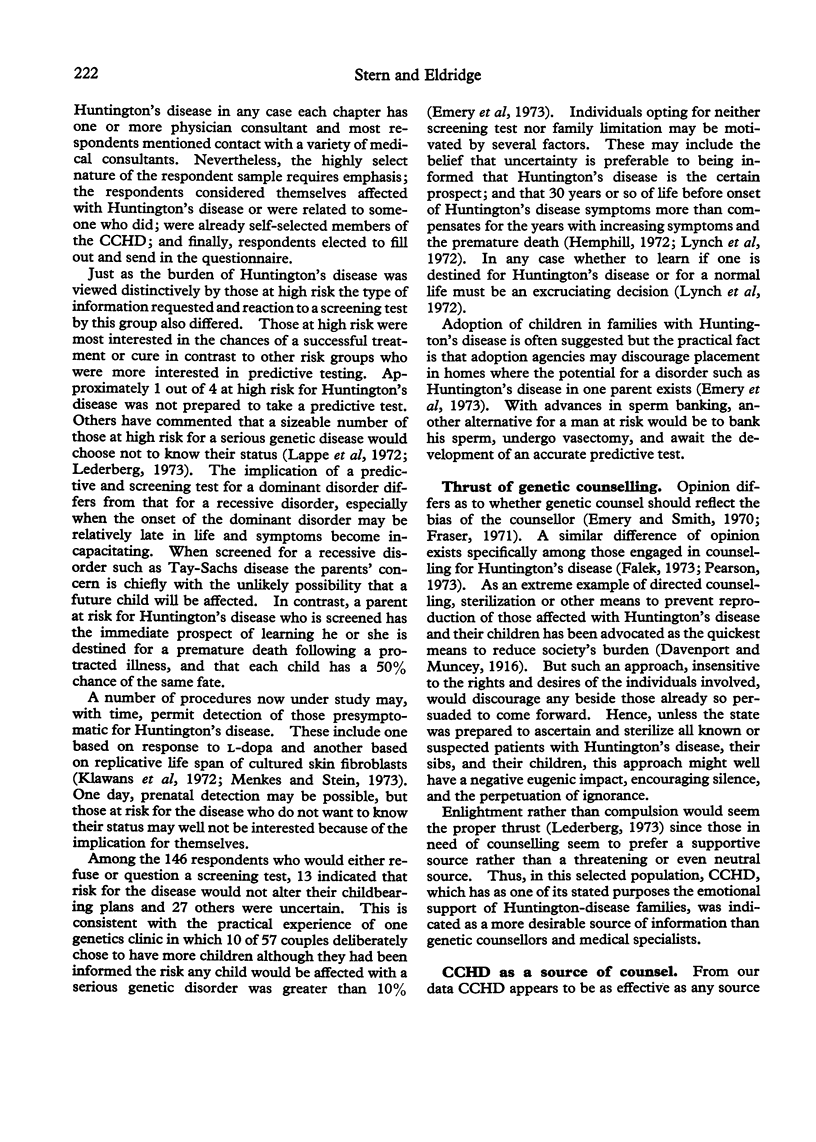
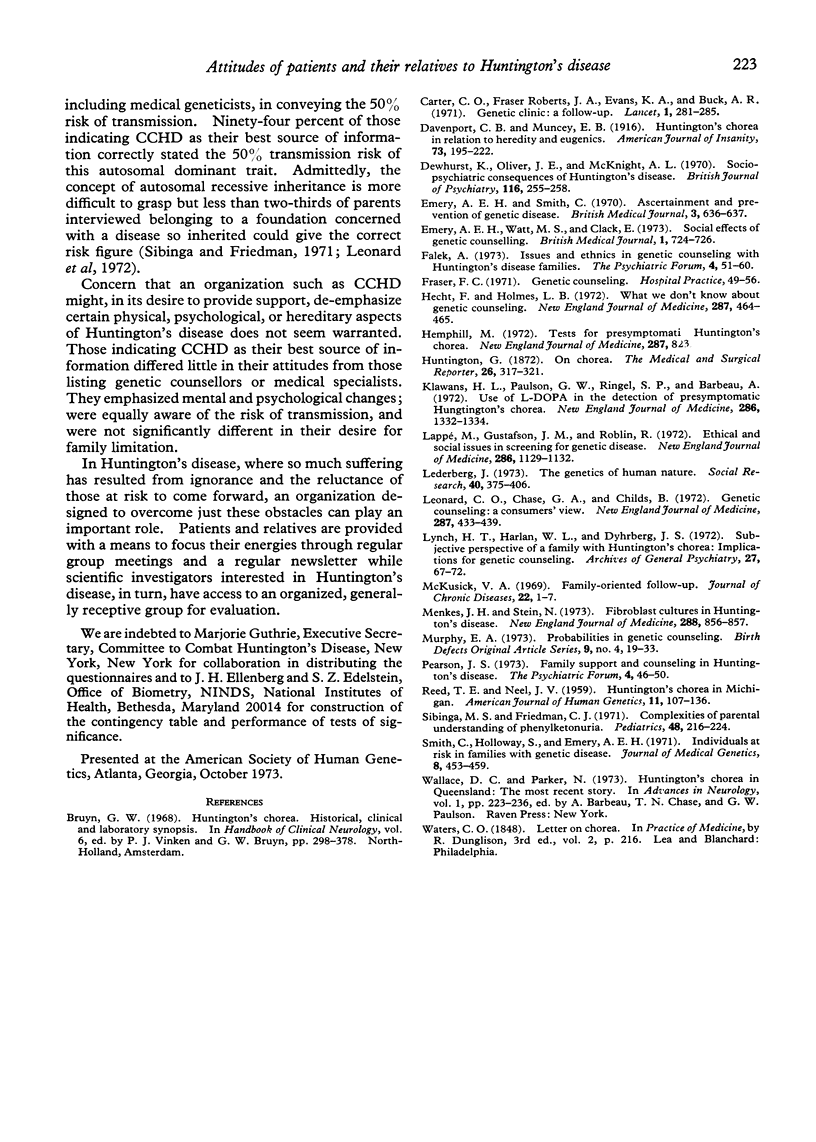
Selected References
These references are in PubMed. This may not be the complete list of references from this article.
- Carter C. O., Roberts J. A., Evans K. A., Buck A. R. Genetic clinic. A follow-up. Lancet. 1971 Feb 6;1(7693):281–285. doi: 10.1016/s0140-6736(71)91016-6. [DOI] [PubMed] [Google Scholar]
- Dewhurst K., Oliver J. E., McKnight A. L. Socio-psychiatric consequences of Huntington's disease. Br J Psychiatry. 1970 Mar;116(532):255–258. doi: 10.1192/bjp.116.532.255. [DOI] [PubMed] [Google Scholar]
- Emery A. E., Smith C. Ascertainment and prevention of genetic disease. Br Med J. 1970 Sep 12;3(5723):636–637. doi: 10.1136/bmj.3.5723.636. [DOI] [PMC free article] [PubMed] [Google Scholar]
- Emery A. E., Watt M. S., Clack E. Social effects of genetic counselling. Br Med J. 1973 Mar 24;1(5855):724–726. doi: 10.1136/bmj.1.5855.724. [DOI] [PMC free article] [PubMed] [Google Scholar]
- Ethical and social issues in screening for genetic disease. N Engl J Med. 1972 May 25;286(21):1129–1132. doi: 10.1056/NEJM197205252862104. [DOI] [PubMed] [Google Scholar]
- Falck Arthur. Issues and ethics in genetic counseling with Huntington's Disease families. Psychiatr Forum. 1973 Fall;4(1):51–60. [PubMed] [Google Scholar]
- Hecht F., Holmes L. B. What we don't know about genetic counseling. N Engl J Med. 1972 Aug 31;287(9):464–465. doi: 10.1056/NEJM197208312870911. [DOI] [PubMed] [Google Scholar]
- Hemphill M. Test for presymptomatic Huntington's chorea. N Engl J Med. 1972 Oct 19;287(16):823–824. doi: 10.1056/NEJM197210192871616. [DOI] [PubMed] [Google Scholar]
- Klawans H. L., Jr, Paulson G. W., Ringel S. P., Barbeau A. Use of L-dopa in the detection of presymptomatic Huntington's chorea. N Engl J Med. 1972 Jun 22;286(25):1332–1334. doi: 10.1056/NEJM197206222862503. [DOI] [PubMed] [Google Scholar]
- Lederberg Joshua. The genetics of human nature. Soc Res (New York) 1973 Autumn;40(3):375–406. [PubMed] [Google Scholar]
- Leonard C. O., Chase G. A., Childs B. Genetic counseling: a consumers' view. N Engl J Med. 1972 Aug 31;287(9):433–439. doi: 10.1056/NEJM197208312870904. [DOI] [PubMed] [Google Scholar]
- Lynch H. T., Harlan W. L., Dyhrberg J. S. Subjective perspective of a family with Huntington's chorea. Implications for genetic counseling. Arch Gen Psychiatry. 1972 Jul;27(1):67–72. doi: 10.1001/archpsyc.1972.01750250055007. [DOI] [PubMed] [Google Scholar]
- Menkes J. H., Stein N. Fibroblast cultures in Huntington's disease. N Engl J Med. 1973 Apr 19;288(16):856–857. doi: 10.1056/NEJM197304192881624. [DOI] [PubMed] [Google Scholar]
- Murphy E. A. Probabilities in genetic counseling. Birth Defects Orig Artic Ser. 1973 Apr;9(4):19–33. [PubMed] [Google Scholar]
- REED T. E., NEEL J. V. Huntington's chorea in Michigan. 2. Selection and mutation. Am J Hum Genet. 1959 Jun;11(2 Pt 1):107–136. [PMC free article] [PubMed] [Google Scholar]
- Sibinga M. S., Friedman C. J. Complexities of parental understanding of phenylketonuria. Pediatrics. 1971 Aug;48(2):216–224. [PubMed] [Google Scholar]
- Smith C., Holloway S., Emery A. E. Individuals at risk in families with genetic disease. J Med Genet. 1971 Dec;8(4):453–459. doi: 10.1136/jmg.8.4.453. [DOI] [PMC free article] [PubMed] [Google Scholar]


